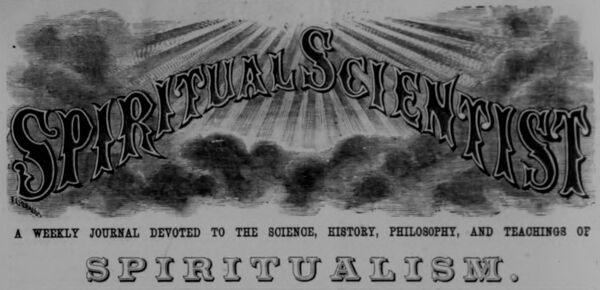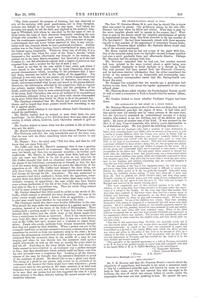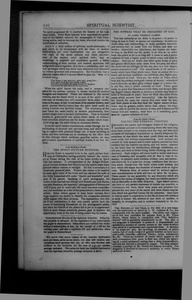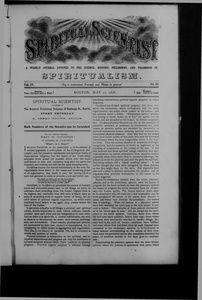Reincarnation?
Mr. F. K. Munton said that Mr. Stainton-Moses's remarks about the objectivity of apparitions, had brought to his mind a statement made to him by a celebrated scientific man, well known by name to every· body in that room and who had assured him that one night in his bedroom the door f which was always bolted, he awoke under the impressin that some one was speaking to him. He opened his eyes, and saw what he thought to be a human form near the foot of the bed. Gradually the form became more distinct, and he saw before him a woman who said, “I am your sister.” As he had no sister he doubted the statement, and asked what she meant. She replied that his spirit had been in another body two hundred years before, and that she at that time had been his sister. He (Mr. Munton) remarked to the narrator of the anecdote that he supposed he must have been in a dream. The reply was that he knew he had not been dreaming, because he got out of bed and wrote down the story he was then telling. He further stated that the form diminished and disappeared, and not through the door. The man who made this statement was one of the most eminent scientific men living. Perhaps he dreamt it, then rose and wrote it out on paper. The society should investigate all the alleged cases of apparitions it could, because whether it exploded them or proved them to be true, it would equally be doing good.
A member asked whether the scientific man just mentioned was a believer in Spiritualism?
Mr. Munton replied that he thought that on the whole he was convinced of its truth, but not because of the particular event just narrated.
Mr. Stainton-Moses asked whether records of phenomena were received by the society?
The Chairman: Yes.
Mr. Stainton-Moses continued that he should like to submit a case. A friend of his who lived in Lincolnshire died, and he was invited to the funeral. He could not go, and was sitting quietly at home in London at the time, without being conscious in any way of anything abnormal. He became unconscious, and afterwards found by his watch that he had been in that condition for two hours. Afterwards, bit by bit, the details of the funeral of his friend came into his mind; or, rather, bit by bit he brought to recollection a scene he had witnessed. He remembered seeing the officiating minister and the mourners, just as if he had been present at the funeral, so he put all the details down on paper; moreover, he the same day posted a full account of the funeral to a friend of his who had been at it, who wrote back in complete astonishment as to how he could have obtained the details. The minister was not the one whom he had previously expected would officiate at the funeral, the clergyman having been changed at the last moment. That was a fact for Dr. Carpenter. The funeral started from Lincolnshire, but took place in Northamptonshire; he saw and described the churchyard, a particular corner of the churchyard, and particular tree there. He did not think that he dreamt all this, but if he did dream it was every word of it true. He put this forward as a curious psychological fact.
Mr. Stainton-Moses continued:—"In the early days of this society I narrated how a drowning person saw all the events of his life pass before his eyes in a short time. I have now another case of the kind which I wish to lay before the Society; it is quoted from Whymper’s Scrambles amongst the Alps, in the years 1860-1869, and describes his sensations in falling from a great height. In ascending the Matterhorn, Mr. Whymper, who was alone, slipped and fell in attempting to pass a difficult corner at an angle of the cliffs of the Tete du Lion. He thus describes the result:—‘The knapsack brought my head down first, and I pitched into some rocks about a dozen feet below: they caught something, and tumbled me off the edge, head over heels, into the gully; the baton was dashed from my hands, and X whirled downwards in a series of bounds, each longer than the last—now over ice, now into rocks, striking my head four or five times, each time with increasing force. The last bound sent me spinning through the air in a leap of fifty or sixty feet, from one side of the gully to the other, and I struck the rocks luckily with the whole of my left side. They caught my clothes for a moment, and I fell back on to the snow with motion arrested. My head fortunately came the right side up, and a few frantic catches brought me to a halt in the neck of the gully, and on the verge of the precipice.’ The injuries Mr. Whymper had received were sufficiently serious. His head was badly cut, and his body showed more than twenty cuts, from which the blood spurted ‘in blinding jets at each pulsation.’ Crawling to a place of safety he fainted away, and remained in an unconscious state till sunset. His description of his sensations is worth noting. He thus describes them:—'I was perfectly conscious of what was happening, and felt each blow, but like a patient under chloroform, experienced no pain. Each blow was, naturally, more severe than that which had preceded it, and I distinctly remember thinking—Well, if the next is harder still, that will be the end. Like persons who have been rescued from drowning, I remember that the recollection of a multitude of things rushed through my head, many of them trivialities or absurdities, which had been long forgotten; and, more remarkable, this bounding through space did not feel disagreeable. But I think that in no very great distance more consciousness, as well as sensation, would have been lost, and upon that I base my belief, improbable as it seems, that a fall from a great height is as painless an end as can be experienced. The loss of blood, although so great, did not seem to be permanently injurious. The only serious effect has been the reduction of a naturally retentive memory to a very commonplace one; and, although my recollections of more distant occurrences remain unshaken, the events of that particular day would be clean gone but for the few notes that were written down before the accident.’”
Mr. Serjeant Cox said that a relation of his served in the Abyssinian war, and went elephant hunting. After he shot at one animal the elephant ran after him, caught him, and tried to toss him with its tusks. The elephant missed its aim, broke two of his ribs, and then lifted him in the air on its tusks, at the same time twisting its trunk over him to kill him. At that moment the commanding officer fired at the elephant, and killed it. This adventure occurred to his (Mr. Serjeant Cox’s) own son-in-law, who stated that while upon the elephant’s tusks he was in constant fear of death, but had not the slightest feeling of horror. The sensation was one of perfect calmness.
Mr. Gordon asked whether Mr. Stainton-Moses thought he had seen the funeral in a dream.
Mr. Stainton-Moses replied that he had not said that it was a dream. He had not said what it was, but had left it for the members of the society to give their own explanations. If any of them said that it was a dream, the onus probandi rested with those who made the statement.
The Chairman remarked that the case of the ghost at York really merited investigation. It appeared outside the church window, above ground. It was a female form which first passed across the window in one direction, and on her return in the other usually brought with her a child. It was said that this ghost had been seen with more or less frequency in York for more than 300 years.
Mr. Gordon: Is she performing now? (Laughter.)
The Chairman continued that she was still in the habit of appearing. The writer in the Newcastle Chronicle stated that she had a definite and distinct figure, and that even her features could be distinguished. Those who had seen the appearance were not able in any way to account for it, while persons inside had been looking at the figure, people had been watching the church outside and had seen nothing.
Professor Plumtree asked whether the name of the church had been published.
Mr. Harrison: Yes. Holy Trinity Church, York.
The Chairman added that he thought it was a very proper thing for the society to investigate.
Mr. F. K. Munton, hon. secretary, said that he would make official inquiry into the matter. (Applause.)
Mr. George Harris then replied to such of the remarks as had borne reference to his paper. He thought that the story could not be so very easily explained away. In the first place a prediction had been made, which prediction afterwards came true. Then again the identity of the alleged spirit seemed to be proved. The reason why the Duke made the appointment early in the morning was because he was at that time at leisure, but during the rest of the day he spent much of his time hunting with the king. It had always been considered to be a wellattested story, but he must leave the members of the society to form their own opinions about it, and to provide their own explanations.
The Secretary announced that at the next meeting a paper would be read by Mr. Serjeant Cox.
The Spirit Picture Business
Horatio Eddy is reported to be in the spirit picture business at Chittenden, having probably learned the mystic art of Evans during the visit of the latter worthy at Spirit Vale last summer. A correspondent of the Religio-Philosophical Journal declares that Horatio and the spirits make these pictures wihout camera or sunlight. All that is necessary is a chemically prepared plate. Horatio also claims to be inspired by some spirit artist of the brush and has adorned the walls of the Eddy homestead with some “fearful and wonderful" products of his genius. Speaking of spirit photographs, the writer of this has had two sittings with Mumler, two with Brown, one with Hazelton, the “specialty” photographers of Boston, one with Evans, and in every case the result was most unsatisfactory and worthless as a test of the extraordinary claims of these artists. Some sitters appear to have better success, but a large majority are unable to identify the companion shadows which appear with their pictures. The explanation, very simple if not satisfactory, is that only certain spirits have the power of impressing themselves on the photographic plates, and when the friends of the sitters fail to put in an appearance there is most always somebody present glad to improve the opportunity, even at the risk of being asked why he comes.
< Cabalism (continued from page 3-137) >
The “Matrix of the Womb" means the human mind or instrument of conceiving and receiving ideas, wherein the wit! of the moon or man, and ultimately the sun or soul become blended in one for the “generation of all things” new.
I trust that this will help some on the way to the transmutation and aid others in decyphering Paracelsus and other abstruce writers.
What is Occultism?
I believe Occultism to be essentially a re-incarnation of ancient paganism, a revocation of the Pythagorean philosophy; not the senseless ceremonies and spiritless forms of those ancient religions, but the Spirit of the Truth which animated those grand old systems which held the world spell bound in awe and reverence long after the spirit had departed, and nothing was left but the dead decaying body.
Occultism asserts the eternal individuality of the soul, the imperishable force which is the cause and sustaining power of all organization, that death is only the casting off of a worn out garment in order to procure a new and better one.
“So death, so called, can but the form deface. |
Occultism, in its efforts to penetrate the arcana of dynamic forces and primordial power, sees in all things an unity, an unbroken chain extending from the lowest organic form to the highest, and concludes that this unity is based upon an unity of ascending scale of organic forms of being, the Jacob’s ladder of spiritual organic experience, up which every soul must travel before it can again sing praises before the face of the Father.
<... continues on page 3-136 >
Editor's notes
- ↑ image by unknown author. Spiritual Scientist title
- ↑ Reincarnation? by unknown author, London Spiritualist, No. 196, May 26, 1876, pp. 245-6. Part of title is lost
- ↑ The Spirit Picture Business by unknown author, Spiritual Scientist, v. 4, No. 10, May 11, 1876, p. 110. Part of title is lost
- ↑ What is Occultism? by Buddha, by California, Spiritual Scientist, v. 4, No. 10, May 11, 1876, p. 109-10. The ending is recovered by HPB in handwriting.




